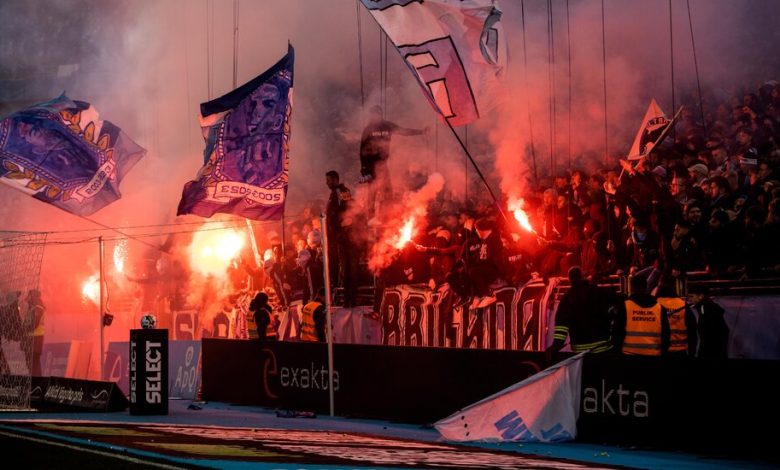Swedish Soccer Prioritized Fans Over Finances. Now, Business Is Booming.

The warning sounded over and over, first in Swedish and then in English. A fire had been detected. Please evacuate the stadium. The players left the field. Outside, fire crews were arriving. But in the stands, as a thick cloud of smoke wreathed and coiled in the floodlights, nobody moved. The fans were going to make the game happen by sheer force of will.
It was a game they had been anticipating for some time. The top two teams in the Allsvenskan, Sweden’s elite league, had gone into the final day of the season separated by just three points. A quirk of scheduling fate meant that their last game was with each other. Malmo, the host, had to win to claim the championship. Elfsborg, the visitor, needed only to avoid defeat. It had been billed as a guldfinal: a gold-medal match.
The idea of a single game that decides the destiny of a league title is vanishingly rare in modern soccer, where championships are won over the course of a season rather than in a winner-take-all final. It has not happened in England since 1989, and Italy has not produced such a denouement in more than half a century.
It is also increasingly unusual for a title even to be in play as the season draws to a close. Over the last 30 years, soccer has become so financially stratified that many domestic tournaments are little more than monthslong processions for the wealthiest teams. Sweden, though, is different, a solitary beacon of competitive balance. In four of the last six editions of the Allsvenskan, the championship has gone to the wire.
How it has produced that is a story of rejecting orthodoxy, of asking why sports exist and whom they exist for. But it is also a story of how hard it is to stand alone, and how fragile even the most heartening success can be.
A Different Path
The walls of Malmo’s Eleda Stadium are full of mementos of the glory days, the era when Swedish teams could compete with Europe’s giants and, occasionally, beat them.
In 1979, Malmo, fielding a team of amateurs, made it all the way to the European Cup final. It is still the only Scandinavian team to feature in the game and its successor, the Champions League final. In the 1980s, IFK Gothenburg twice won (lesser) continental trophies. As late as 1994, IFK beat Manchester United and Barcelona in the Champions League.
Those victories proved a last stand. The game’s dynamic changed drastically as money rushed into soccer in the 1990s, first from broadcasters, then private investors, and finally oligarchs, corporations and nation states. The riches created a new class of unassailable domestic powerhouses.
“Big money fed the biggest clubs,” enabling them to construct squads full of superstars, said Mats Enquist, who served as general secretary of Svenskelitfotboll, or SEF, the body that runs Sweden’s professional leagues, from 2012 until early this year. For Sweden, as for many countries outside Europe’s major television markets, he said, it was “impossible to keep up.”
Instead of grasping at shadows, Sweden’s response was — effectively — to opt out. In 1999, the country enshrined in law a rule that 51 percent of its sports teams had to be owned by their members: the fans. In 2007, when that rule was challenged, the fans fought fiercely to protect it.
“That was the moment that the fans first realized the power they had,” said Noa Bachner, the author of a book that examines Sweden’s rejection of soccer’s economic orthodoxy.
Yet they wielded it over a bleak landscape.
“Crowds were going down, the standard of play was not good, the league had a lot of problems with hooliganism,” Mr. Enquist said. A survey that he commissioned as one of his first acts found that only 11 percent of fans regarded the Allsvenskan as their favorite competition, far behind England’s Premier League and the Champions League. “It was not a good place to be,” he said.
Mr. Enquist was an outsider to soccer when he took a leading role in it: a software entrepreneur by trade, and a volleyball and golf fan by inclination. It was his job, though, to sort it out.
His solution set Sweden on an almost heretical path in modern soccer. Unable to turn to rich investors, the SEF harnessed the country’s most obvious strength, the fans. In the face of considerable skepticism, the authorities “touched hands” with the supporters, Mr. Enquist said, and set about designing a league they wanted to watch, and watch live.
They negotiated limits on behavior, designating invading the field and throwing missiles as red lines but allowing a tacit leeway on pyrotechnics in service to spectacle. They persuaded the police to adopt a more conciliatory approach rather than “treating all fans as potential hooligans,” as Lars-Christer Olsson, the league’s president until this year, said.
A decade later, the transformation has been staggering. Almost alone among Europe’s mid-tier league, Swedish soccer is a picture of health. It has had 11 different champions in 20 years. Attendances have doubled in the last decade; this year brought record crowds. The league’s revenues have tripled in the same period. Now, more than 40 percent of Swedish fans identify the Allsvenskan as their priority.
The game of the year between Malmo and Elfsborg should have been the perfect distillation of all that work, an illustration of what makes Sweden a standard-bearer for a different version of soccer. Instead, it highlighted how fine the line is between empowering fans and losing control of them.
The start of the second half was delayed by 30 minutes as Elfsborg’s fans confronted a line of riot police officers, and then by another half-hour when Malmo’s ultras, the team’s most hard-core supporters, set off so many smuggled-in pyrotechnics that they triggered the fire alarm. When Malmo’s victory was secured, thousands of fans rushed the field. A handful raced toward their Elfsborg counterparts and hurled lit flares into their packed sections.
“There is a thin margin,” said Pontus Jansson, a veteran defender who returned to Malmo this year after a decade abroad to draw the curtain on his career. “They stepped over it.”
For Fans, By Fans
The moment when Malmo’s players and staff claimed their title — two hours later, once all the smoke had cleared — was a homespun sort of occasion. They walked out in small groups to collect their medals, in velveteen presentation boxes, from a collapsible table. There were no glitter cannon or smoke machines at their backs.
Instead, the photo that will one day grace the walls alongside all the other mementos of triumphs past captured the two elements that make up the club: the players and, massed on the field behind them, the fans.
Everything Swedish soccer has become has been constructed by, and for, the people who go to watch it in stadiums. Mr. Bachner, the author, reels off the start of a long list of examples: the absence of corporations, sovereign wealth funds and “multiclub projects” from the ranks of club owners; sustained investment in women’s teams; an unofficial ban on holding training camps in authoritarian states; a rule stating that the league has to give at least two months’ notice before moving games for television.
The clearest illustration, though, is that Sweden — alone among Europe’s major nations — has resisted the introduction of video assistant referees. The clubs, at the behest of their members, have consistently voted against the technology, a source of controversy elsewhere because of its not-infrequent errors and interminable delays.
“I think the fans have the feeling it disturbs the ambience in the stadium,” Mr. Olsson said.
There are things that Sweden’s democratic tradition cannot vote out of existence. Malmo’s championship, for example, means another potential infusion of Champions League income that might be enough to give the club — already Sweden’s richest — an insurmountable competitive advantage.
The issue of the ultras, too, poses a problem. “It feels as though there are two games taking place,” Mr. Bachner said. “One on the field, and one in the stands, where these groups are seeing how they can display their power, and they don’t mind if 20,000 other people have to wait around while they do it.”
Sweden is not the only country facing that challenge, but Mr. Bachner acknowledged concern that the chaos on the season’s showcase day would lead to calls for more aggressive policing, which could threaten the delicate alliance between the authorities and the fans.
To many, that would be a step back. “It might not be the best league in Europe,” said Johan Lindvall, the league’s chief executive, “but the atmosphere in the stands is.” Matchdays are both the cornerstone on which all the success has been built, and the proof of how far it has come.
“After we scored the goal, the noise was crazy,” Mr. Jansson said. His presence alone is a case in point. He had spent the past seven years becoming part of English soccer’s furniture. Just 32, he could perhaps still be playing there, amid the superstars of the Premier League. Instead, in April, he chose to come home to experience what Swedish soccer had become.
“That atmosphere,” he said. “That’s what brought me back.”




